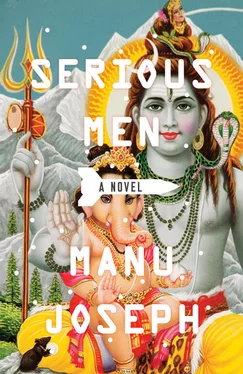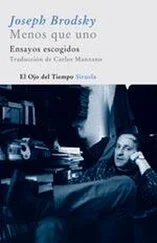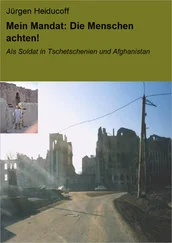Lavanya was certain that her husband would soon rescue himself from the trance of his new abnormality and return to the old. She was more concerned about her daughter. Shruti did not talk to her father any more. She had called him a month ago to say that he must be brave, but when she read about the affair on a website, she first asked her mother if it was true, and did not speak to him after that.
Shruti’s anger did not affect him. He was grateful to anyone who would offer him silence. But every day, he tried to understand what had happened to him. He wandered inside the Institute in that confusion. Old friends smiled at him. He would look at them with feeble eyes and nod. Young postdoctoral students called him names. He would nod at them too. Sometimes on the pathways, he would stop walking and just gape at his feet.
One Monday all this changed, for no reason at all.
He was sitting under a solitary palm in the backyard of the Institute when he thought of something that made him so happy that he felt his life and its many memories return to him. He had been briefly estranged from himself, but now he was all right. He got up and walked briskly towards home.
Acharya let himself in. Lavanya was asleep on the couch with Digging to America on her lap. He stood beside her and looked at her tired face. Her eyelids quivered and opened. She was surprised to see him standing like that.
‘I want to talk to you,’ he said.
‘Talk then,’ she said, sitting up. She was relieved to hear him speak finally.
‘Lavanya,’ he said, ‘you may not know this, but I’ve thought of you every single day of my life, and my life was very good because of you. Does that make sense to you? What I just said, does that make sense you to?’
She looked worried. ‘Are you all right, Arvind?’ she asked.
‘I also have a confession to make,’ he said. ‘During a Cosmic Ancestry seminar, I said, “Ladies and Gentlemen, it’s my deepest belief that all life on Earth came from outer space, not just my wife.
Lavanya burst out laughing. ‘It’s OK,’ she said, standing up. She tried to understand what could have happened to him, but she was too amused to solve the mystery. ‘Sit down, I will get you a cup of coffee,’ she said.
Acharya went to the balcony. He looked at the concrete driveway, nine floors below, and calculated that it would take him no more than two seconds to hit the driveway. He inspected the wooden railing and hoped it would take his weight. He did not want to break it. That would be inelegant. The suspended shrubs were too far back to get in the way. Two shirts hung from the clothes wire and they looked like orphans, already. He sat on the railing and slowly rose on his feet. He balanced himself with his hands in the air. He felt a bit ridiculous, and it struck him how unaesthetic the process of suicide actually was.
As he stood perched to jump, it was inevitable that he would think of his whole life. ‘It was easy,’ he summarized. He wondered why he did not feel the intensity of death, the final ache of the very end of memories, and the indestructible peace of liberation. Instead, his mind was filled with too many thoughts that reminded him of his old desperation to live every moment. He was thinking of the frustrating problem of gravity at the moment of death, standing on a railing nine floors above the ground. He was even embarrassed on behalf of humanity for not solving the elementary question — What exactly is gravity? It was shameful that man did not know what gravity actually was. How pathetic. And he felt a wild rancour towards theoretical physicists who said that gravity was made up of gravitons. What rubbish. He wanted to understand why there was life, what was the true nature of Time, and he wanted to comprehend the beautiful absurdity of infinity which was the only real evidence mankind had to prove that maths was fundamentally moronic. There was so much to do, he thought, on either side of the wooden railing. Then he felt an inglorious fear. That, he recognized, was not the trivial fear of falling. But it was the memory of the devious friends of Lavanya, and how their faces began to glow after the death of their husbands. He wondered if Lavanya, too, would find happiness in the relief of widowhood, choosing to love him more as an enhanced memory in a photo frame than as a giant living slob. He felt an intense bitterness that only a husband can feel for his wife. And in a moment of pristine jealousy he wanted to deny her the pleasure that she might derive at his expense. He slipped on the railing, but found his balance in time.
Beneath the solitary palm when he had prescribed to himself the simplicity of death, he was certain that he had arrived at an obvious solution. His mind was dead, his spirit was dead, and they were beseeching from another world to relieve the body too. But now he understood what had happened to him since the day of the trial. He understood why he did not feel anything after they consigned him to the short blacklist of fraudulent scientists. The truth was, as always, simpler than he thought. What they had killed was not his mind, or spirit, or other things that might not exist at all. What they had killed was his stature. The great Arvind Acharya, the Nobel laureate who did not win a Nobel. The Big Bang’s Old Foe. The lone discoverer of aliens. That being had been slain. And the confusing numbness of death inside him was actually the paradise of relief. All his life he had tried to hide the torments of one paranormal boyhood experience. He had hidden them behind the manly grandness of science. His cerebral deformity which others called genius had made it easy for him to understand the mathematical pursuit of truth and it had quickly shrouded him in an inescapable glory when he was very young. He was entrapped in a fame that he feared he would lose if he tried to explain that every single action in the world was preordained, or if he attempted to investigate the purpose of life. Now that he was stripped of his reputation, he was free. He could now become the prophet of a new form of science that would not try to understand the universe through particles and forces but through the great game of life.
The decision of a woman in the market to buy cabbage instead of brinjal, the decision of a man at a junction to turn left instead of right: what if these events were as preordained as the birth of a star and its inevitable death? If the flutter of a butterfly or the shudder of a flower in the breeze was preordained aeons ago, he would now find a way to understand it. There would be no shame in that. Because every man grants others the power to shame him, and Arvind Acharya decided to withdraw that privilege from the world.
He walked into the hall, dusting his trousers. He sat with his elbows on the dining-table. Lavanya came with a tray. She watched him curiously. ‘Are you all right, Arvind?’ she asked.
He did not reply. He sipped his coffee and looked around the house as though it were the first time he was here.
At that moment, she was reminded of her mother’s prophecy, a day before her wedding, that he would go completely mad one day.
‘But he seems so happy,’ she had told her mother.
Her mother had stopped scrubbing the copper plate, and said, ‘It’s not only the sad who go mad, my child, it is also the happy.’
Acharya set the cup on the table and stood. He steered his trousers around his waist and walked out of the house. He began to see things in a way he had never seen them before. The corridor that led to the lift was grey and it had pieces of splintered tiles arranged in concentric circles. The liftman was dark and lost, and he had a mole at the edge of his lip and another one at the edge of his nose, and there was a strand of hair sticking out of both. That reminded him of Lavanya’s hypothesis many years ago that the cure for balding might be in the mysteries of melanin because the longest strand of hair on the limbs and the face, she said, always rose from the moles. The little girl who was playing in the driveway where she might have seen him fall, had he not tried to understand himself in time, was wearing a frock with fractal motifs. And she looked so beautiful that he hoped she would never ever hear the word ‘fractal’ in her life. There were four guards at the gates of the Institute and they were in ash-grey shirts and black trousers, and black caps with two red streaks that were parallel to each other. He looked at the fork of the pathway and the square lawn and the L-shaped main block and the people going about. He felt as if his vision had improved. Like that evening on the Marine Drive where he had once gone to escape Oparna’s love. The grey fog of rain had vanished and a strange light had filled the city.
Читать дальше












